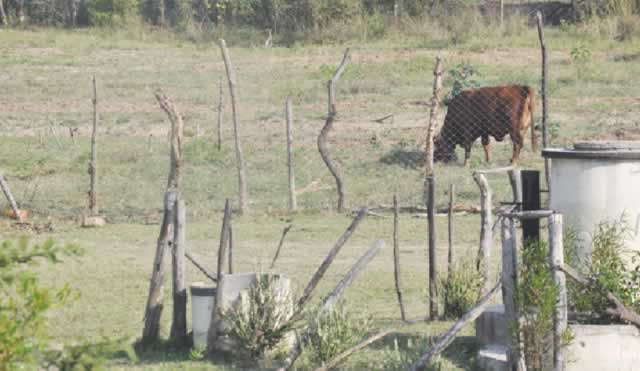Market gardening option for schools in Ntabazinduna

Feature Nkosilathi Sibanda
PRODUCTIVE agriculture has over the years been difficult to achieve for most farmers in Ntabazinduna, Matabeleland North province. The area is at the heart of semi-arid plains, where there is a perennial shortage of water and grazing. The vast sandy lands have an extensive savanna vegetation and are a major deforestation concern in Zimbabwe.
This, coupled with poor agricultural practices and limited access to the latest farming machinery and techniques, Ntabazinduna farmers have, for years, been clueless on how to improve their farming activities.
The nightmare for farmers is adapting in a place that receives low rainfall every year. If ever there is an abundance of rain, it would be a case of sheet floods that wash away soil nutrients. It has taken a nutritional garden initiative at Madlelenyoni Primary School to prove that various forms of agriculture can thrive in the area.
At a time when agricultural experts are constantly researching about how to alleviate the effects of drought, Madlelenyoni Primary School has made significant strides in turning the so-called barren terrains of Ntabazinduna into productive use.
The vegetable allotment at the school has done more than just produce food for the pupils. The community is benefiting too and now Ntabazinduna is on the verge of transforming its agricultural potential.
The garden was as a result of a schools competition organised by the Environmental Management Agency (EMA) in 2010. The project has ignited hope that sustainable produce on school grounds can also raise food awareness to the greater community.
EMA engaged the Ministry of Primary and Secondary Education in its environment awareness campaign and formulated a nutritional garden contest. The invitation was well received, with many rural schools taking part.
Idah Lusinga, the headmistress then, was an early adopter of the competition. Together with Abigail Mupinga — a teacher at the school, they pioneered the market gardening project.
Soon after spearheading it, the two teachers were transferred, leaving the project under the capable hands of a colleague, Douglas Zidla. Having won the national finals of the EMA competition, Madlelenyoni Primary School invested the prize money into market gardening.
The school took the bold decision to use the competition prize money to expand its garden and instal a borehole pump. Previously, the school scrambled for water with villagers at the only community borehole available.
“It was one of the bravest decisions we’ve made as school authorities and parents. ‘‘The prize money was enough to build a classroom. There was a lot needed to be done around but we chose the garden project,” said Zidla.
The garden has different types of vegetables and herbs, including basil, rape, cauliflower, okra, parsley, pumpkin, spinach, beans and several tomato varieties. The plants are in raised beds. The school sells the produce to surrounding communities.
“Everything harvested is sold to villagers. At times when we make huge profits, we use the money to cover school fees arrears for pupils in need,” said Zidla. He said through the gardening project, they could afford to give the elderly vegetables for free twice a week.
“Selling these vegetables has improved people’s diet. People no longer go hungry. They’ve realised how cheap and essential vegetables are.” Madlelenyoni Primary School nutritional gardens have promoted out of class activities that are critical in strengthening academic, personal, and social skills.
“Our pupils now have a different lifestyle. They’ve improved their knowledge of nutrition and expanded their food preferences. This is what we aim to do,” said Zidla.
EMA Matabeleland North provincial manager Chipo Zuze-Mpofu said the Madlelenyoni garden project is a classic example of how schools can help raise awareness on sustainable agriculture. “Providing vegetable produce to the community of Ntabazinduna is a way of reaching out to the communities.
‘‘Pupils are taught the fundamentals of environmental issues at the same time being skilled in agricultural techniques that help protect the environment,” said Zuze-Mpofu. Zidla concurred saying raising food awareness is an important aspect of their garden.
“It’s difficult to practise full scale agriculture in Ntabazinduna because the growing season here is short. ‘‘That’s why we thought of the borehole above everything else, in order to extend the growing season. Hopefully, we’ll get more land so that we’re able to increase our produce,” he said
Teachers and pupils at Madlelenyoni Primary School have embraced the project that has also inspired villagers to start their own gardens, which are expected to improve food security and promote nutritious diets.
The school remains cautious that the nutritional garden has to be managed and monitored well. Critics of nutritional gardens often point to poor project design and management being the cause for such projects to collapse.
Pupils, teachers and community members share valuable knowledge and experience on how to optimally plan, design and plant nutritional gardens. “Our pupils are young but they’re being trained on how to farm. This is a plus for the community of Ntabazinduna,” said Zidla.
Khayelihle Tshuma, a villager in the area said they never imagined themselves getting knowledge from their children on how to grow vegetables. “The school is giving us hope. Never did we think we would be planting these types of vegetables.
‘‘I’d be happy if my son comes home and starts digging up our small garden saying he wants to do exactly what they learn at school,” said Tshuma. The Madlelenyoni project is in sync with the country’s economic blueprint, Zim-Asset, particularly the food security and nutrition cluster.
“The view is that schools can contribute towards efforts to overcome hunger and malnutrition. ‘‘We’ve realised that school gardens can help to improve nutrition and education of children and their families in both rural and urban areas,” said Zuze-Mpofu.










Comments